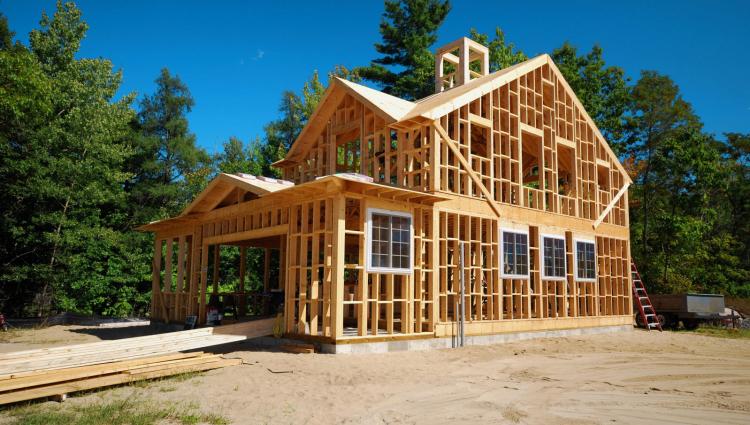To say ‘Thank you’ for being a Farm Credit member, we’re inviting you and your family to join us for a day of fun this June.
Each event will include a meal and family-friendly activities, in addition to time to network with other members of your cooperative.
Check out the list of events below and click the registration on the event you’d like to attend. Once you’ve registered, you will see important details, including event times and address. One Farm Credit Day event registration per family.
Newsroom
Understanding Your Crop Insurance Coverage Quote

by Joel Alsdorf, Crop Insurance Agent
“As days lengthen, the cold strengthens,” my grandfather often said, contrasting it with his other favorite saying, "make hay while the sun shines." As farmers, we use this time to manage crucial details, from maintenance and repairs to pre-ordering seeds and chemicals, all setting the stage for the year ahead. Amidst these decisions, reviewing your crop insurance program's value is essential. Though overwhelming at times, your policy should provide peace of mind, allowing you to focus on field work during sunny days.
Your relationship with your crop insurance agent should ensure confidence in your decisions. Your Farm Credit agent uses their expert training to help you understand available options, often expressed through quotes. Quotes may seem complex, however they simply compile numerical values for easy comparison. Your agent will tailor a quote to fit your operation, considering factors like risk management, profitability, and budget.
Developing a strong relationship with your agent is key. Let's unpack the basics of quote analysis and define what information is included in your crop insurance quote:
- Plan type: Abbreviations like RP (Revenue Protection) or YP (Yield Protection)
- Unit Structure: BU (basic unit), EU (enterprise unit), OU (optional unit)
- Coverage Level: Typically 50-85% indicating deductible percentage
- Acres: Total or easily calculable number
- Average Yield: Your own or county average
- Total Coverage: Dollar value guaranteed per acre
- Total Subsidy: Government-subsidized amount per acre
- Producer Premium: Cost per acre after subsidy
- Fees: Premium and processing fees
Crop insurance quotes can feel overwhelming, but your agent can help. Understanding your operational goals ensures quotes meet your needs. Reach out to your agent as you plan for the year ahead.
When you’re ready to review your policy, or learn more about how crop insurance can benefit you and your business, give us a call to speak with a member of our crop insurance team today at 888.339.3334 or click here to learn more.
Please enter a valid password to access this page:
Wrong password. Try again!Newsroom
Farmers’ Integral Role in Shaping Ag Tech Innovation

by Joe Waddell, Horizon Farm Credit’s Director of Market Innovation
After spending more than a year wading through the ag tech scene and orienting myself to the advancements in that space, I find myself reflecting on the value and usability of new and emerging ag tech innovations. I often wonder what farmers have to gain from these proposed solutions, and if we’re truly addressing and understanding the daily challenges farmers face at the ground level.
Within the agriculture industry, there is no cookie-cutter approach to solving shared complex issues across the same segment, let alone multiple segments. While outside viewpoints often bring fresh perspectives to potential solutions, there seems to be a key element missing in much of the early discussions around creating said solutions — involvement from those in the trenches, our farmers.
Communication and Innovation
Like many issues that pop up in our daily lives, there is usually a common theme that either causes or helps solve the problem at hand — communication, or lack thereof. Too little communication brings about innovations that either don’t address the issue at hand or are too costly to implement.
We must then ask ourselves how we change the culture of communication within the ag innovation space to foster a more robust pathway to success. No matter how well-intentioned, solutions that require a heavy upfront investment and long road to tangibly see payoff often face a much lower success rate.
There’s something to be said for a direct investment approach in current ag tech solutions at the farmgate. Could we stretch dollars to have an immediate impact on farm level sustainability? And, how do we get a better grasp directly addressing solutions on-farm? A solid communication pathway between those developing ag technology and end-users is vital to bringing about solutions that are viable in the marketplace and sustainable long-term.
The Role of Perspective in Decision-Making
Choosing a solution that makes the most sense for an operation typically revolves around personal perspective. For example, sustainability holds a different meaning for each person, and deciding which solution is most sustainable for an operation is subjective. From examining what can be done to impact the bottom line to make a business viable in the future, to exploring approaches that incrementally lead to greater efficiency, developing a one-size-fits-all solution is nearly impossible.
Beyond that, farming budgets are often on a razors edge of profitability. When thinking about the return on investment, solutions don’t always need to provide a strict monetary outcome — although, those do see the highest adoption rates. Often, the decision to adopt different practices or technologies is impacted by time gained because of efficiency, which allows an indirect monetary gain. Time is money, as they say.
What works for one operation may not work for another, and that’s the beauty of innovation. Whether old technology or new, many factors influence producers’ decisions, with perspective playing a major role in the adoption — or lack thereof — of innovations.
The Farmer’s Voice
When the experiences, challenges, and feedback of farmers is sought out during the innovation process, those solutions often see the highest rate of adoption. Success hinges on gathering the perspectives of farmers to ensure new innovations and technologies truly address root problems, while also keeping cost efficiency in mind. It’s vital ag tech innovators work hand-in-hand with farmers to develop solutions that work for farmers and enhance the success and profitability of their operations.
Interested in keeping up-to-date with the latest trends in ag? Reach out to me at jwaddell@horizonfc.com to talk shop.
This blog is part one in a two-part ag technology spotlight. Check back next week for part two.
Please enter a valid password to access this page:
Wrong password. Try again!Newsroom
Horizon Farm Credit Awarding Grants to New and Beginning Farmers

Mechanicsburg, PA — Horizon Farm Credit invites new and beginning farmers to apply for the JumpStart program, which provides grant funding to help new farmers establish and grow their operations.
The JumpStart grant program awards $10,000 to top applicants in the start-up phase of business and is part of the larger, comprehensive Grow Ahead program, which provides additional resources and support for those just starting out in agriculture. This year, up to 15 JumpStart grants will be awarded.
Eligible applicants must be at least 18 years of age or older as of April 19, 2024, must have two years or less of farming experience — or be planning to begin farming within the next two years — and must reside in Horizon Farm Credit’s territory. Current Farm Credit customers and non-customers are eligible to apply.
Those meeting program requirements are encouraged to apply at horizonfc.com/jumpstart. Applications will be accepted March 1, 2024, through April 19, 2024, and there is no cost to apply.
“Supporting those seeking to make their mark in agriculture is vital to the growth and prosperity of the industry as whole,” said Tom Truitt, Horizon Farm Credit Chief Executive Officer. “Farm Credit is thrilled to help new and beginning farmers achieve their dreams by providing financial support, and the JumpStart program reinforces the Association’s commitment to delivering support for the next generation of farmers and producers.”
More information about the JumpStart grant program can be found at horizonfc.com/jumpstart, and questions can be directed to learning@horizonfc.com. To learn more about the comprehensive support Farm Credit provides to young and beginning farmers, visit horizonfc.com/growahead.
About Horizon Farm Credit
Horizon Farm Credit is a member-owned agricultural lending cooperative, providing consistent and reliable financing and related services to full- and part-time farmers, agricultural-related businesses, and rural landowners. The Association serves 100 counties across Delaware, Pennsylvania, and parts of Maryland, Virginia, and West Virginia. The Association has more than 22,100 members and over $6.5 billion in loans outstanding. Learn more at horizonfc.com.
Please enter a valid password to access this page:
Wrong password. Try again!Newsroom
Home Construction Loans 101

Once you’ve decided that you’re ready to build your dream home, you may be wondering what to do next. Should you start looking for land, housing inspiration on Pinterest, or talking to a lender? There are many questions and resources that can be confusing, so we are here to help!
Below, you will find helpful information on how to prepare for a building project, how to research contractors/builders, construction loans with Farm Credit, and what the loan closing process entails.
Bonus: Scroll to the bottom for a free educational resource and a chance to connect with one of our lenders!
Where do I Start?
Congratulations – you’re ready to build! If you don’t already own land to build on, we can discuss financing the land with the construction at the same time. For this to happen, you will have to have the construction contract and blueprints ready to go up front.
Once you bought the land, you’ll want to get to know potential builders to determine who you’re most comfortable with. We recommend researching local companies and looking at their previous work. Start with a quick internet search or request referrals so you can speak with a client they have serviced in the past. If you have the opportunity, you may want to walk through properties they are currently building. If you’re struggling with locating a builder, our team of experts can recommend someone in your local area.
We do require a licensed contractor to serve as your general contractor through the whole process, and highly recommend finding current or past projects the builder has worked on so that you can see their work firsthand and determine if it fits your needs and wants. We try our best to prepare our customers looking to build, and sometimes they are unaware of how long the process can take. We recommend working with a trusted builder to ensure you have an open and honest conversation about what you are looking to build and what expectations to have.
The cost of construction has also increased over the last few years so it may be more expensive than you are expecting. Working with a builder from the beginning helps you construct a budget, set expectations, and then discuss your options with lenders.
What to Research: Builder and Contractor Edition
Once you’ve identified the builder you plan to work with, it’s best to be as prepared as possible for the first meeting, including developing a list of things you would like to discuss. Below are a few examples:
- What type of home are you looking to build? Stick built, modular, timber, etc.?
- Does the contract include everything for a “turnkey” construction contract or will parts of it need to be subcontracted out?
- What kind of warranties do they offer?
- Do they have any referrals or testimonies that they can offer?
Doing your research ahead of time will ensure that you are working with a reliable and reputable builder. As a reminder, we do require a licensed contractor to work as your general contractor. We do not allow self-building.
Construction Loans with Farm Credit
At Farm Credit, portfolio loans are financed at 80% of the appraised value. If you do not have the equity in the property or cash to supplement the 20% down payment, we can explore secondary mortgage market construction loans that typically can finance up to 95%. Be sure to have a detailed contract with your builder before working with lenders because the appraiser will depend on these details to give an accurate value of the property.
Farm Credit will finance up to 80% of the overall appraised value of the property “as if” the house is already built. We are able to use any existing equity from the property to go towards the down payment. It is a good idea to have an estimate or proposal written up for the construction project. Farm Credit requires 10% of the cost of construction available for cost overruns. This can be held in cash or savings, stock or investments, gift from family or it can potentially be financed. If averages do not occur, no cash has to be spent. We do have both credit and debt to income ratio standards.
Closing on a Farm Credit Construction Loan
When building on large acreage, we can account for the true value of the full acreage. Not all lenders value every acre. Land is our specialty, so we can count the value of every acre (larger acreage means more value). This will give you more equity in the property and can potentially reduce the amount of cash you need to put in for construction. Additionally, we can roll existing land loans into the construction loan for one loan on a 30-year term. We require interest only payments on funds disbursed during the 12-month construction period, which then rolls into a fully fixed mortgage with fixed payments. Use our loan calculators to calculate your payment here.
Another advantage of working with Farm Credit is that buyers will only pay closing costs when the loan initially closes, meaning there are no closing costs when the loan switches to permanent financing. Farm Credit offers note modifications in place of refinances for rate purposes, lowering interest rates when they come down for a flat fee. These do not require a new title or appraisal, and no additional closing costs outside of the fee. In short, note modifications can save you time and money in the long run, when rates shift in your favor! These can be done an unlimited number of times over the life of the loan and will be advised upon by your Farm Credit lender.
As you can see, there is a lengthy process when it comes to preparing to build and we want to be there for you every step of the way. Get connected with a lender today to see how we can help you get into your dream home!
Please enter a valid password to access this page:
Wrong password. Try again!Newsroom
How to Move Forward in a High Interest Rate Market

We know that the market conditions right now are less than ideal for getting a loan. This can be frustrating especially for people looking to buy for the first time or even tenured buyers looking to move to a new location or downsize for the future. As your financial lending experts, we want to provide you with insight and guidance on how to move forward in this market so you can make an informed decision.
What are the current market trends?
Right now, the mortgage market trends across our area encompass high interest rates and low housing inventory. First time home buyers, people looking to downsize or upgrade, or buyers just looking to move locations may struggle to find properties that meet all of their expectations. With rates determined by the Federal Reserve, there is no telling to how long the market will remain this way, so you may need to get creative, think outside of the box, and perhaps venture down a path that you didn’t mean to go down at first and consider financing options or loan structures that are different than your run of the mill mortgage.
How do you move forward? What are your options?
Given these trends, it may be hard to find your dream home right now, and it is imperative to be patient throughout the process. Taking your time and talking with a trusted lender will help set realistic expectations and goals when property shopping. Keeping an open mind and exploring all of your options may lead you to more opportunities that you did not consider at the start of your journey. Working with an experienced real estate agent that understands rural home lending is key to a smooth transaction. Working together, your lender and real estate agenda can help you understand specialized properties, appraisals, zoning, etc.
What is a note modification?
Once you finally found the property for you and are ready to consider applying for a loan, knowing the ins and outs of your loan product is key. Farm Credit offers a note modification, or rate reduction option, which means that we will honor a new interest rate if they come down after signing for your loan. Your Farm Credit lender will analyze the change before making it permanent to ensure it makes sense for you and your situation. It also means that your interest rate is locked in and can never go up again, even when rates are increasing.* Another benefit to a note modification is that is does not require refinancing or closing costs again, but instead it is changed with one flat fee.
Trusting Farm Credit as a partner
When searching for a home, you want to connect with someone that will listen to your wants, needs, and concerns. The first step should always be to discuss your dream and what your intentions are with the home or land you are looking to buy. This can help your lender figure out the best loan product for you and the terms that are going to set you up for success.
In longer term loans, the note modification option Farm Credit offers is a great way to save money over the years. We have specialized tools that will break down those savings when rates drop to ensure it makes the most sense for you. Farm Credit’s lending options are unique, and we boast a network of referral partners to tap into when extra financing support is needed.
With higher rates, it can be a challenge qualifying for the home you need. Farm Credit looks at your financial statements to make sure all income is accounted for, including money earned by side jobs or overtime income. Farm Credit understands buying and selling rural properties and your local lender is ready to help you discuss your best lending options.
As you can see, Farm Credit has your best interest (ha ha) when it comes to searching for the perfect property for you and your family. We care about your success and want you to feel supported every step of the way. Click the link below to be contacted by one of our lenders who can help you get started!
*This applies only to fixed rate options.
Please enter a valid password to access this page:
Wrong password. Try again!As the leading farm and agriculture financial experts, our loan specialists know how to guide
To ensure we’re delivering on our commitment to meeting and exceeding your expectations, we will be consolidating our Quarryville, Pennsylvania, office into our Mount Joy, Pennsylvania, office effective August 1, 2024.
Don’t worry, though — the quality service and friendly staff will remain the same!